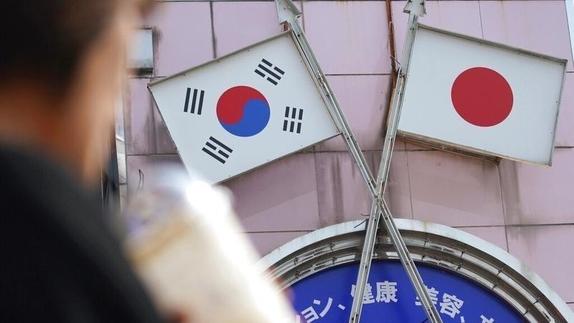 A woman walks past an advertisement featuring Japanese and the Republic of Korea's flags at a shop in Shin Okubo area in Tokyo, Aug 2, 2019. (PHOTO / AP)
A woman walks past an advertisement featuring Japanese and the Republic of Korea's flags at a shop in Shin Okubo area in Tokyo, Aug 2, 2019. (PHOTO / AP)
SEOUL - Despite a "superficially" closer relationship with Japan, South Korea's friendly gesture met with only cold reception from its eastern neighbor and protests from its own people.
South Korea sent a 21-member team to Japan last week on a mission which, according to South Korean Foreign Minister Park Jin, would be an important opportunity to "check all the information" on Japan's planned discharge of nuclear-contaminated wastewater from the crippled Fukushima Daiichi nuclear power plant into the Pacific Ocean.
Tokyo disagreed.
Yoo Jung-ju of the Democratic Party denounced the historical perception of the Yoon government and the ruling party as they failed to take issue with it, saying Busan was a bridgehead for Japan's invasion of the peninsula
Japanese Minister of Economy, Trade and Industry Yasutoshi Nishimura denied the remarks the following day, saying the South Korean team will not evaluate or confirm the safety of the wastewater.
On Thursday, Song Ki-hun, deputy floor leader of South Korea's main opposition Democratic Party, said it was an "insipid" inspection of the contaminated water discharge facilities, not of the contaminated water itself directly affecting the safety of people.
Also, Seoul and Tokyo dreamed different dreams about the international standing of South Korea.
Yun Duk-min, South Korean ambassador to Japan, said in Tokyo last week that Seoul wanted to become a member of what could be the Group of Eight by joining the Group of Seven (G7).
ALSO READ: Japan, South Korea to hold first security talks in 5 years
However, Japanese Prime Minister Fumio Kishida said in an interview with South Korean newspaper Joongang Ilbo last month that there had been no discussion of increasing the membership within the G7.
South Korea had become a "psychological" G8 nation, said a spokesman of the country's ruling People Power Party, regarding President Yoon Suk-yeol's attendance at the G7 summit as a guest last month.
Earlier this week, a Japanese warship entered South Korea's southeastern port city of Busan for a multinational naval drill near the southern resort island of Jeju.
The warship arrived here with the so-called Rising Sun flag hoisted. Although the South Korean government went so far as to defend the militaristic history of Japan, the move triggered harsh criticism as it symbolizes Japan's past militarism.
The Korean Peninsula was colonized by Japan from 1910 to 1945.
ALSO READ: S. Korea regrets Japan PM's offering at notorious war shrine
Yoo Jung-ju of the Democratic Party denounced the historical perception of the Yoon government and the ruling party as they failed to take issue with it, saying Busan was a bridgehead for Japan's invasion of the peninsula.
Rapping the South Korean defense ministry's echoing the Japanese stance that the current flag is different from what used to be the Rising Sun flag, the lawmaker noted that the ministry rather sided with the symbol of invasion entering Busan.
Civic activists gathered near the Japanese consulate in Busan to protest against the arrival of the Japanese warship, as well as wartime issues such as sex slavery and forced labor, which were "kind of" solved due to the South Korean government's compromises.
People of the Korean Peninsula were forced by Japan into sex servitude for military brothels and heavy labor without pay before and during World War II.
READ MORE: S. Korea to suspend WTO dispute with Japan
The activists demanded that Japan should fulfill its obligations with its acknowledgment, compensation and sincere apology for the war crimes against humanity.


